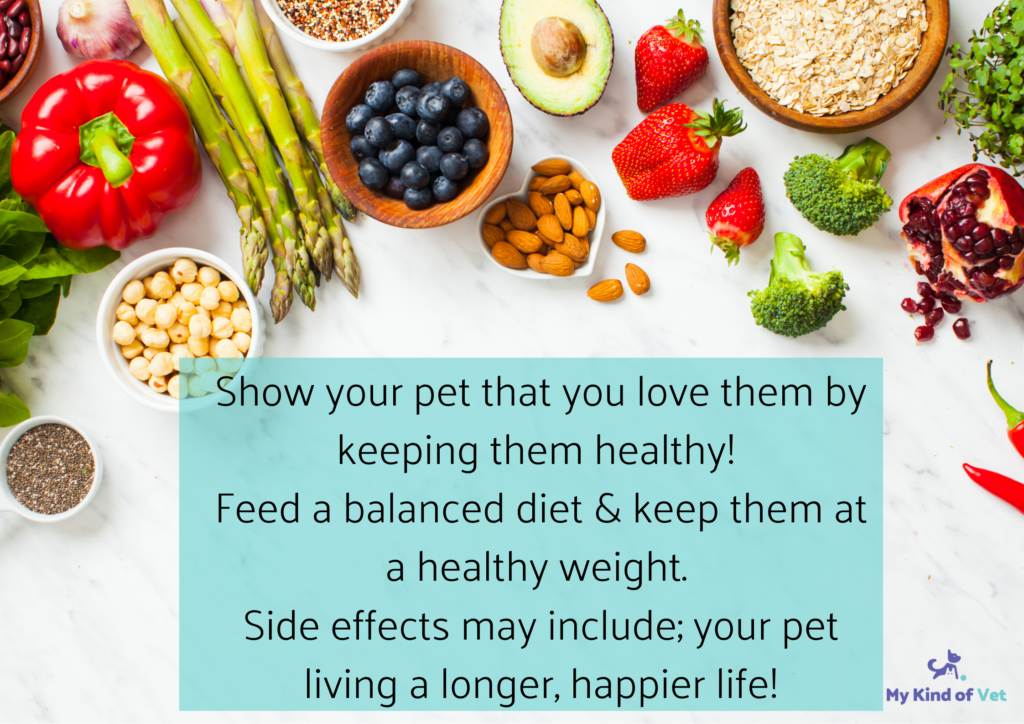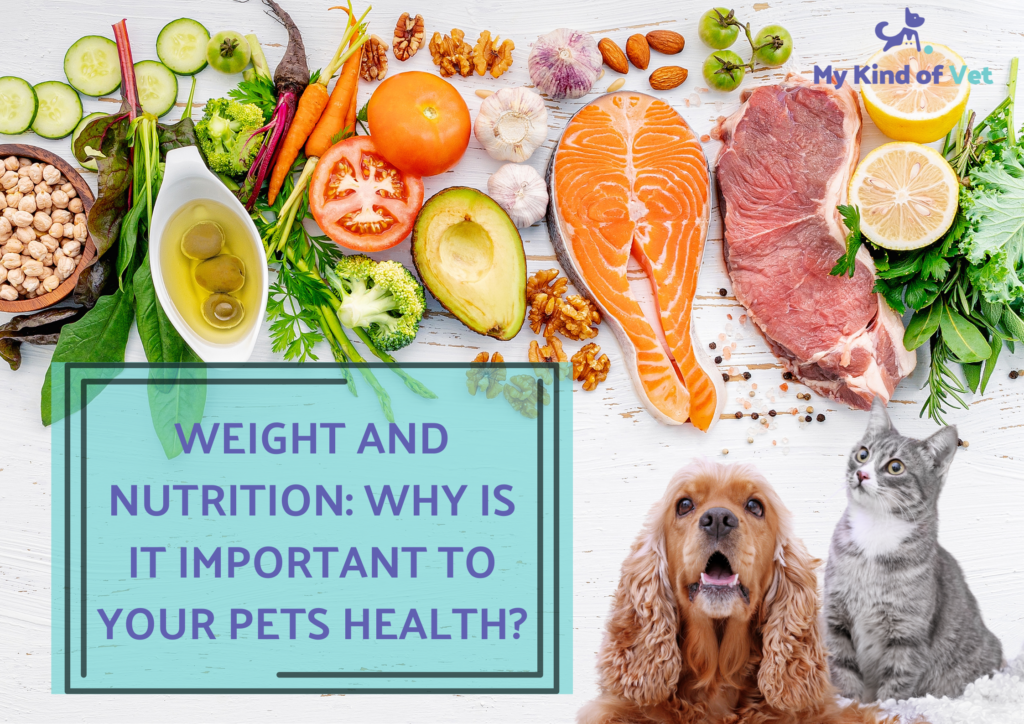WEIGHT & NUTRITION
Weight and nutrition are the 2 biggest controllable health factors for your pets. Their weight and nutrition is in your hands and making the right choices for your pet can mean they life longer, happier and healthier lives!
Why is weight important to the health of your pet?
Keeping your pet at a healthy weight is crucial for their overall well-being and can have a significant impact on their quality of life. Here are several reasons why maintaining a healthy weight in your pets is important:
- Joint Health: Extra weight places additional stress on a pet’s joints, which can speed up conditions like arthritis. Maintaining a healthy weight can help reduce pain and discomfort associated with joint problems and improve mobility.
- Heart Health: Obesity in pets can lead to heart problems, such as congestive heart failure and hypertension. Maintaining a healthy weight can reduce the risk of these cardiovascular issues.
- Respiratory Health: Excess weight can put pressure on the respiratory system, making it harder for pets to breathe. This can be especially problematic for brachycephalic breeds (e.g., Bulldogs, Pugs) that already have breathing difficulties.
- Diabetes Prevention: Obesity is a significant risk factor for diabetes in pets. Maintaining a healthy weight can reduce the likelihood of your pet developing diabetes and the need for insulin treatments.
- Digestive Health: Obesity can lead to gastrointestinal problems and increase the risk of conditions like pancreatitis. A balanced weight helps maintain a healthier digestive system.
- Longevity: Studies have shown that pets kept at a healthy weight tend to live longer and have a better quality of life.
- Mental Health: Obesity can also impact a pet’s mental health. Overweight pets may be less active and less inclined to play, which can lead to boredom and depression. Keeping them at a healthy weight promotes mental stimulation and a happier disposition.
- Reduced Risk of Other Health Issues: Maintaining a healthy weight can reduce the risk of various health problems such as certain types of cancer, skin issues, and urinary tract problems.

How do I know if my pet is overweight?
Determining if your dog or cat is overweight involves a few key observations:
- Body Condition Score (BCS): This is a subjective evaluation of your pet’s body shape and condition. You can typically find charts online that show what a healthy weight looks like for various breeds. A veterinarian can also help you assess your pet’s BCS during regular check-ups.
- Ribs and Waist: You should be able to feel your pet’s ribs easily without pressing too hard. Additionally, there should be a noticeable waist when viewed from above. If your pet’s waist is not distinguishable or if you can’t feel their ribs easily, they might be overweight.
- Activity Level: Changes in your pet’s activity level can be indicative of weight gain or loss. If your pet is less active than usual or seems to tire more easily during exercise, it might be due to excess weight.
- Breeds Standards: Some breeds have specific standards for weight and body shape. Researching breed-specific guidelines can give you a better understanding of what a healthy weight looks like for your pet.
- Health Issues: Overweight pets are more prone to certain health issues such as diabetes, joint problems, and heart disease. If your pet is experiencing any health problems, it’s essential to consult with a veterinarian to determine if weight might be a contributing factor.
If you suspect your pet may be overweight, chat to us, or your regular veterinarian, or come into our clinic for a free weigh in and body condition score
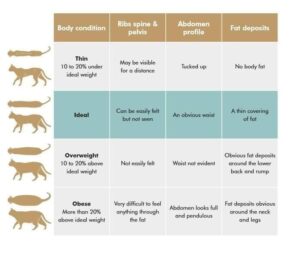
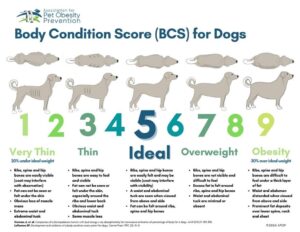
To help your pet maintain a healthy weight, or loose weight if required;
- Consult Your Veterinarian: Consult with your veterinarian to determine your pet’s ideal weight and receive guidance on a suitable diet and exercise plan.
- Balanced Diet: Feed your pet a well-balanced, age-appropriate diet that meets their nutritional needs. Avoid feeding them table scraps or excessive treats.
- Portion Control: Measure your pet’s food portions to prevent overeating. Be mindful of calorie intake. Don’t leave food out for your pet to “graze”
- Regular Exercise: Engage your pet in regular exercise to help them maintain muscle mass and a healthy weight. Activities such as walks, playtime, and swimming can be beneficial.
- Monitor Weight: Keep an eye on your pet’s weight and body condition score, and make adjustments to their diet and exercise routine as needed.
Remember that every pet is unique, so it’s essential to work closely with your veterinarian to create a personalised plan that suits your senior pet’s specific needs and health status. Maintaining a healthy weight can significantly enhance your pet’s overall quality of life and increase their chances of living a longer, happier life.
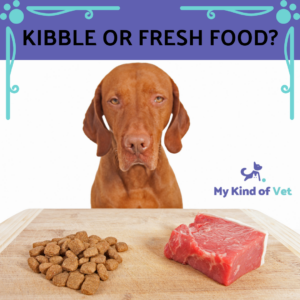
Kibble vs fresh food
Kibble (Dry Food):
- Convenience: Kibble is convenient to store, handle, and serve. It has a longer shelf life and doesn’t require refrigeration.
- Cost: Generally, kibble is more affordable than fresh food options.
- Nutritional Balance: Many commercial kibbles are formulated to meet the nutritional needs of pets, with added vitamins and minerals. Kibble tends to be considered the easier way to ensure you a feeding your pet a balanced meal.
- Particular health needs: Some types of kibble are designed to assist you feed your pet with a specific health condition; such as liver, kidney or urinary issues.
- Stability: It’s less prone to contamination and spoilage compared to fresh food.
Cons:
- Quality: Some lower-quality kibbles may contain fillers, preservatives, and additives that offer less nutritional value.
- Digestibility: Some pets may have difficulty digesting certain ingredients in kibble, leading to digestive issues.
- Water Content: Kibble typically has lower moisture content, which might not be ideal for pets who don’t drink enough water.
- Weight: Kibbles are often high in carbohydrates which can quickly cause weight gain in pets
Fresh Food (Raw or Cooked):
- Nutritional Quality: Fresh food offers a more natural and potentially higher-quality source of nutrients, including proteins, fats, and vitamins.
- Hydration: Fresh food, especially raw food, contains higher moisture content, helping pets stay hydrated.
- Digestibility: Some pets digest fresh food more easily than processed kibble, leading to fewer digestive problems.
- Potential Health Benefits: Fresh food feeding may provide benefits such as healthier skin and coat, improved immune system, improved digestion and nutrient absorbtion, and better weight management.
- Customisation: Fresh food diets can be tailored to meet specific dietary needs, such as food allergies or sensitivities.
Cons:
- Expense: Fresh food diets can be more expensive than kibble, especially if using high-quality ingredients or pre-prepared meals.
- Preparation: It requires more time and effort to prepare fresh food, including sourcing ingredients, meal planning, and proper storage.
- Risk of Contamination: Raw diets can pose a risk of bacterial contamination to pets and their owners if not handled and stored properly.
- Nutritional Imbalance: Without proper formulation, homemade diets may lack essential nutrients or be unbalanced, potentially leading to deficiencies or health issues.
Ultimately, the choice between kibble and fresh food depends on factors like your pet’s health, dietary preferences, lifestyle, and budget. Consulting with a veterinarian or veterinary nutritionist can help you make the best decision for your furry friend.
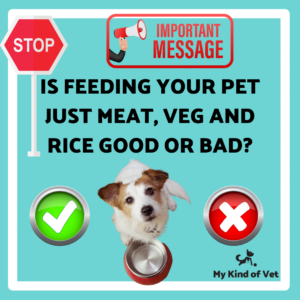
The importance of a balanced diet:
Too often we hear of people feeding only, or similar to; chicken or mince, vegetables and rice. Although done with the best of intentions in trying to feed pets a fresh and healthy diet, this method is not nutritionally balanced and can actually do a lot of harm to your pet. Your pet requires a balanced meal for optimal health. If you would like to fresh food feed your pet, we are happy to help you with a diet plan or correct knowledge on making your pet a balanced and healthy meal. If you are not certain you are providing a balanced diet with all the essential nutrients your pet requires, you may consider a balanced commercial product until you have all the knowledge you need to make your own.Feeding a cat or dog a diet solely consisting of chicken, vegetables, and rice can lead to several long-term health issues due to nutritional deficiencies and imbalances:
- Protein Deficiency: While chicken provides protein, it may not offer a complete amino acid profile essential for pets. Lack of essential amino acids can lead to muscle wasting, weakness, and impaired immune function over time.
- Taurine Deficiency (Cats): Cats require taurine, an amino acid found primarily in animal-based proteins like meat and fish. Taurine deficiency can lead to severe health problems in cats, including heart disease, vision impairment, and reproductive issues.
- Vitamin and Mineral Deficiencies: Chicken, vegetables, and rice may not provide adequate levels of essential vitamins and minerals required for optimal health. For instance, deficiencies in vitamins A, D, E, and B-complex vitamins, as well as minerals like calcium, phosphorus, and zinc, can lead to various health problems ranging from weakened bones to impaired immune function.
- Omega-3 Fatty Acid Imbalance: Without a diverse diet that includes sources of omega-3 fatty acids such as fish oil or certain plant-based sources, pets may develop an imbalance of omega-3 to omega-6 fatty acids. This imbalance can contribute to inflammation, skin issues, and compromised cardiovascular health.
- Carbohydrate Overload: While rice and vegetables provide carbohydrates, dogs and cats have limited ability to digest and derive nutrition from plant-based sources. Feeding excessive carbohydrates can lead to weight gain, diabetes, and digestive issues.
- Dental Health Concerns: Feeding a soft diet lacking in dental-chewing opportunities may contribute to dental plaque and tartar buildup, increasing the risk of dental disease over time.
- Obesity: Without careful portion control and balance, a diet high in carbohydrates and lacking in essential nutrients can lead to obesity, which predisposes pets to a range of health issues such as diabetes, joint problems, and decreased life expectancy.
- Behavioural Issues: Nutritional deficiencies and imbalances can impact a pet’s behaviour, leading to issues such as lethargy, irritability, and decreased cognitive function.
To ensure your pet receives a balanced and nutritious diet, it’s essential to consult with a veterinarian or veterinary nutritionist. They can provide guidance on appropriate pet foods or help formulate a balanced homemade diet tailored to your pet’s specific nutritional needs.
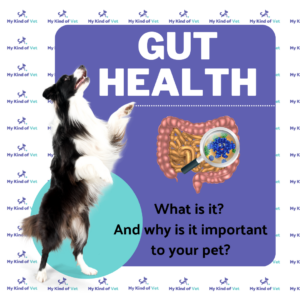
Gut health
Gut health is important for both dogs and cats for several reasons, just as it is for humans. The gastrointestinal (GI) system plays a crucial role in their overall well-being, and maintaining a healthy gut can have a significant impact on their health and quality of life. Here are some reasons why gut health is important in dogs and cats:
- Nutrient Absorption: The gut is responsible for absorbing essential nutrients from the food they eat. A healthy gut ensures that dogs and cats can efficiently absorb the vitamins, minerals, and other nutrients they need for growth, energy, and overall health.
- Digestion: Proper digestion is essential for breaking down food into smaller, absorbable components. A healthy gut ensures that food is digested effectively, reducing the risk of digestive disorders like diarrhoea, constipation, or food intolerances.
- Immune Function: A significant portion of the immune system resides in the gut. A healthy gut supports a strong immune response, helping dogs and cats defend against infections and illnesses.
- Microbiome Balance: The gut is home to a diverse community of beneficial bacteria known as the gut microbiome. These microbes play a vital role in digestion, nutrient absorption, and overall gut health. An imbalance in the microbiome (dysbiosis) can lead to digestive issues and other health problems.
- Behaviour and Mood: Emerging research suggests a connection between gut health and behaviour in animals. An unhealthy gut may contribute to mood disorders or changes in behaviour in dogs and cats.
Skin and Coat Health: Gut health can influence the condition of a pet’s skin and coat. An imbalanced gut can sometimes lead to skin issues, allergies, or excessive shedding.
- Weight Management: A healthy gut can aid in weight management. Proper digestion and nutrient absorption can help prevent obesity or malnutrition in dogs and cats.
To maintain good gut health in dogs and cats, consider the following:
- High-Quality Nutrition: Feed your pets a balanced diet that is appropriate for their age, breed, and activity level. Choose high-quality pet foods with ingredients that support digestive health.
- Probiotics: Probiotic supplements can help maintain a healthy gut microbiome. They provide beneficial bacteria that support digestion and immune function.
- Prebiotics: Prebiotics are non-digestible fibres that promote the growth of beneficial gut bacteria. They can be found in certain foods or as supplements.
- Regular Vet Checkups: Schedule regular veterinary checkups to monitor your pet’s overall health and address any gastrointestinal issues promptly.
- Avoiding Toxins: Keep your pets away from toxins, including toxic plants, household chemicals, and foods that are harmful to them.
- Hydration: Ensure your pets have access to clean, fresh water at all times. Proper hydration is essential for digestive health.
Remember that each pet is unique, and their dietary and healthcare needs may vary. Consult with your veterinarian to develop a tailored approach to maintaining your dog’s or cat’s gut health based on their specific requirements and any existing health conditions.
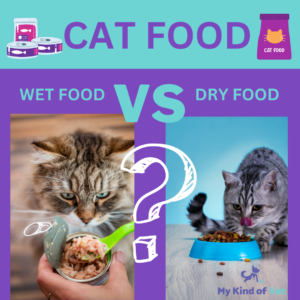
Cat food; Wet or Dry?
A balanced cat diet, like for any other animal, requires to have the correct balance of protein, carbohydrates, fats and fibre. Opposed to dogs, cats are strictly carnivorous, which means they are capable of absorbing all their nutrients from animal protein only, therefore they don’t need any added ingredients if they are eating prey like meals. There’s a special detail that most people forget, animal protein doesn’t mean meat only, animal protein is also present in the gut of their prey, their fur or feathers, their organs etc. In the wild a cat would be eating the entire prey, not only meat as many people offer to their cats. This means that if a cat is eating meat only, their diet is not complete and they are at risk of developing health conditions, such as cardiac disease due to the lack of some nutrients.
Dry foods are very convenient and complete, they are easy to store and are very affordable. However, they contain more carbohydrates than most cats can tolerate, which can cause obesity, diabetes and bowel disease.
Wet foods have a much higher water content, and they can mimic a biological diet more appropriately. A good water intake is important for cats to assist with kidney function, bladder function and general hydration.
Some cats can have serious digestive issues that make choosing their diet a difficult task, but in general words, we recommend feeding wet food or fresh balanced food whenever possible to cats, and if cost is a concern, feeding a mix of dry and wet food can be a great way to combine cost and quality.
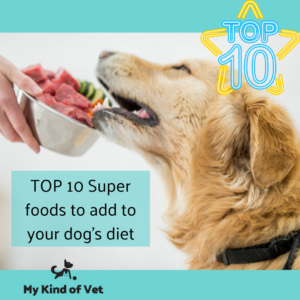
Top 10 Super foods to add to your dog’s diet:
- Pumpkin: Rich in fiber, pumpkin aids digestion and can help regulate bowel movements in dogs.
- Chia Seeds: Packed with omega-3 fatty acids, chia seeds support healthy skin and coat, as well as joint health.
- Secreting Organs: Liver, kidney, and other secreting organs provide essential vitamins and minerals, supporting overall organ function and immune health.
- Blueberries: High in antioxidants, blueberries can help combat inflammation and support cognitive function in dogs.
- Fish: A great source of protein and omega-3 fatty acids, fish promotes healthy skin, a shiny coat, and supports cardiovascular health.
- Coconut Oil: With antibacterial and antiviral properties, coconut oil can boost immunity, improve digestion, and contribute to healthy skin and coat.
- Spirulina: A nutrient-rich algae, spirulina is packed with vitamins, minerals, and protein, supporting overall health and boosting the immune system.
- Kefir: A probiotic-rich food, kefir promotes gut health, aids digestion, and can alleviate symptoms of gastrointestinal issues in dogs.
- Eggs: A complete protein source, eggs provide essential amino acids for muscle maintenance and repair, as well as nutrients like choline for brain health.
- Bone Broth: Rich in collagen, glucosamine, and amino acids, bone broth supports joint health, aids digestion, and provides hydration.
